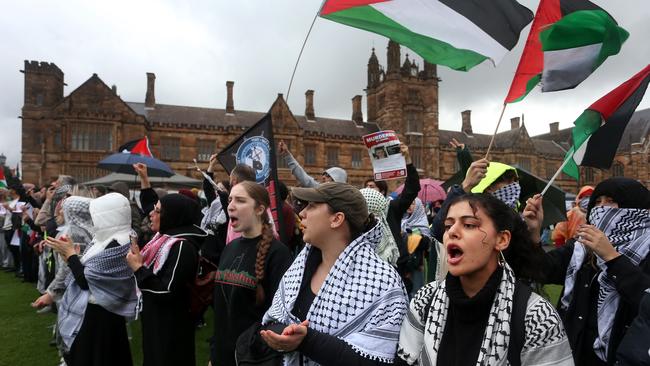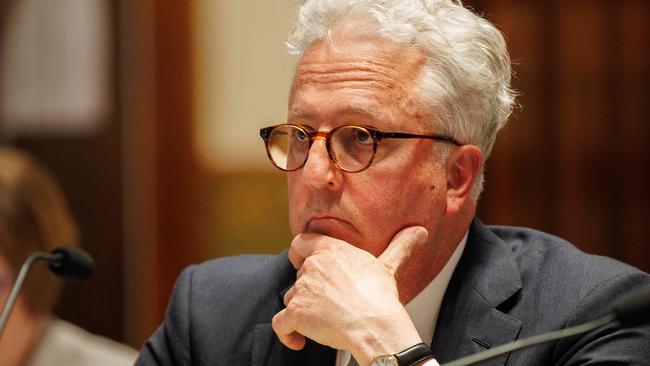‘No one should feel at risk’: Sydney University Vice Chancellor sorry over anti-semitism
Mark Scott apologises over anti-Semitism at the university after Jewish students and staff told a Senate inquiry the campus was ‘probably one of the worst places to be a Jewish student’.

University of Sydney Vice-Chancellor Mark Scott has admitted he has “failed” Jewish students and staff at his university, as he fronted a Senate inquiry into antisemitism at universities.
“Yes, I have failed them and the university’s failed them,” Mr Scott told the inquirty.
He was challenged by opposition education spokeswoman Sarah Henderson and Senator Paul Scarr on whether the testimonies of Jewish students and staff had proved the failure.
“That is why we have made significant changes to our policies,” he said. “That is why further review is underway.
“That’s why we’re committed to working with the Australian Human Rights Commission review and a judicial inquiry.”
He said his university’s newly announced independent review was a “commitment to my leadership, the university’s leadership” and not a “failure” of his leadership over the pro-Palestine encampment protest.
“I said I was sorry for the experience of students,” he said. “What I said now, though, is having been through those experiences at the university, we are putting in place a range of measures to do all we can to manage the tension.”
Professor Scott said NSW police told him they would send “fully-equipped riot police” on campus during discussions about “the possibility of clearing the camp”.
“We were trying to de-escalate the encampment and peaceably resolve it and so that was the decision we made.”
Earlier, Mr Scott apologised over claims of anti-semitism after the inquiry was told the university was “probably one of the worst places to be a Jewish student”.
The Australasian Union of Jewish Students vice-president Zachary Morris singled out the university and its vice-chancellor for criticism at the inquiry, saying of a meeting with Professor Scott: “His chief of staff had to apologise for his behaviour as soon as he left the office.”
He did not clarify what that behaviour was.
“What we’ve been seeing at the University of Sydney has been problematic for a long time,” he said.
Appearing before the inquiry, Mr Scott said: “I read the complaints that have been made to the university and always share the submissions of this inquiry and the special inquiry and the testimonials are heartbreaking and unacceptable, and for that, I am sorry.”
“No one should feel at risk, unsafe, or unwelcome at any place of learning, and no one should feel the need to hide their identity or stay away from classrooms or campuses.
“The university has responsibility to take active steps to ensure a safe environment free from discrimination, and we take these responsibilities seriously.”
He said he now “regret[ed]” the fact that he did not communicate in advance with the Jewish community an agreement he had made with the Muslim students association to end the pro-Palestine protest encampment.

University of Melbourne professor Steven Prawer, a co-director of the Australian Academic Alliance Against Anti-Semitism, recounted to the committee how he was evacuated from his campus office last week by university security.
“Security … chose to evacuate me from my office because a group of students had identified me personally and were marching on my office in physics, and subsequently, I have a security guard outside my office for the next three days, as we were fearful that students would try to break into my office,” he said.
Monash University’s Australian Centre for Jewish Civilisation director David Slucki told the inquiry social cohesion on campus “has broken down” and anti-Semitism was rising “sharply” at universities.
“Staff and students are increasingly unable to have difficult conversations and to truly hear and understand one another’s pain and anguish,” Mr Slucki said.
“Jewish students and staff feel that it is not only their peers but their institutions that have not taken their concerns seriously enough and have not been effective in listening to their experiences.”
Universities Australia chief executive Luke Sheehy defended the University of Sydney’s response to the pro-Palestine encampment protest on campus, saying “mistakes are always made” in emerging situations.
“I have … seen universities take long and protracted and thought through views on how they deal with social cohesion on their campuses,” he told the Senate committee.
“The university took the appropriate action to wrap up the encampment and they took appropriate action to remove people … I reject the fact that the University of Sydney didn’t take appropriate action … it wrapped up and that’s concluded,” he said.
When asked about the Australian National University’s response to a pro-Hamas student, Mr Sheehy said: “Students have made idiotic remarks”.
“They’re inappropriate and the university at the time swiftly sought to undertake a process of disciplinary action,” he said.
“The student in question had appropriate disciplinary action taken by ANU immediately.”
Group of Eight deputy chief executive Matthew Brown said Australia’s elite universities have taken a “principled, whole-of-community approach” since the October 7 terrorist attacks.
In response to questioning from opposition education spokeswoman Sarah Henderson, he insisted anti-Semitism was not “endemic in universities”.
“I’m not saying there haven’t been incidents on Go8 member campuses … in terms of addressing specific incidents … all I can speak to is the commitment of our members in dealing with these incidents,” he said.
“The determination of whether the encampment was a legitimate form of protest was down to the vice-chancellor of the university and if they’ve said that, concur with that as a general principle.”
The Jewish Council of Australia said focusing on university campuses in the inquiry was “clearly” an attempt to “identify the pro-Palestinian movement as the locus” of anti-Semitism.
“The Palestine solidarity movement … is not anti-Semitic,” executive officer Sarah Schwartz told a Senate committee on a judicial inquiry into campus anti-Semitism.
“Much of that content is not anti-Semitic.”
Ms Schwartz drew attention to anti-Semitism on the far right.
“It’s in its DNA, and that is not being covered by an inquiry or a bill that is so focused on campuses, because campuses are clearly being used to identify the pro-Palestinian movement as the locus of anti-Semitism in our society.”
The Jewish Council of Australia has previously been blasted by Jewish community organisations as being unrepresentative.






To join the conversation, please log in. Don't have an account? Register
Join the conversation, you are commenting as Logout